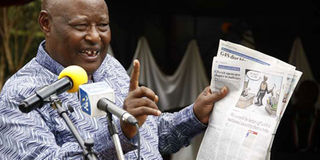Entertainment pages should be reserved for our political news

National Cohesion and Integration Commission Chairman Francis ole Kaparo uses content in the Daily Nation to making a point during a North Rift Leadership Breakfast at Queens Garden Hotel in Eldoret town on June 17, 2016. In newspapers, entertainment pages should be reserved for our political news. PHOTO | JARED NYATAYA | NATION MEDIA GROUP
What you need to know:
- Mr Trump only made it back to the more serious Huffington Post news sections with his shock defeat of Mrs Clinton.
- Or why the Deputy President’s corruption joke should be preserved for Emmanuel Juma’s weekly satirical show, Bull’s Eye, on NTV.
One of the interesting features of the recent US election was the clash between the Republican candidate, now president-elect Donald Trump, and the news media.
Just about every respectable national newspaper, magazine or television channel thought the business mogul, who once hosted the reality TV show "The Apprentice", was a joke.
Mr Trump’s rival, Hillary Clinton, got all the big endorsements, including from The Atlantic, the authoritative magazine that was giving such backing for the first time in 50 years.
The Huffington Post, a popular news website, took probably the boldest step in its quest to put Mr Trump in his place.
The publisher resolved to carry all reports regarding the Trump campaign under its Entertainment section, terming it a sideshow.
And, at the end of each Trump campaign story, there was an unflattering editor’s note explaining who they really thought the candidate was.
Mr Trump only made it back to the more serious Huffington Post news sections with his shock defeat of Mrs Clinton.
Even then the website said it only rescinded its early decision out of respect for the institution of the Presidency.
The Trump treatment in The Huffington Post should be food for thought for the Kenyan national newspapers increasingly caught between trying to deal with reader apathy and playing a role in nurturing democracy.
When the more serious readers say they don’t like our obsession with politics, what do they really mean?
What is it they particularly have a problem with?
Is it the politics itself they have a problem with or our rendering of it as if it were something serious?
Do they find it cheap or just misplaced in our papers?
LAUGHTER
A typical Kenyan political event is, of course, one big entertainment theatre.
It features a cast of politicians allied to the ruling or opposition party taking to the podium to dance, sing, chant, and launch into mchongoano-style personal attacks on their rivals, and a crowd of extras (followers) cheering them on.
Deputy President William Ruto made one of his best political jokes last weekend, pledging to have the corrupt sent to jail.
At the ODM rally in Homa Bay, the area MP Peter Kaluma and his rival, Washington Ogaga, took it a notch higher and introduced the old game of wrestling to the entertainment offering of the day.
The element of political violence promoted the story to the prime pages, but social media feedback showed that it was especially popular for the entertainment value of two grown men suffering an adrenalin rush and getting mundu khu mundu.
Someone tell me why he or she wouldn’t feel thoroughly entertained reading about the Kaluma-Ogaga show in the Entertainment & Culture sections where we occasionally catch up with the fighting exploits of Kakamega’s famous bulls and cockerels.
Or why the Deputy President’s corruption joke should be preserved for Emmanuel Juma’s weekly satirical show, Bull’s Eye, on NTV.





